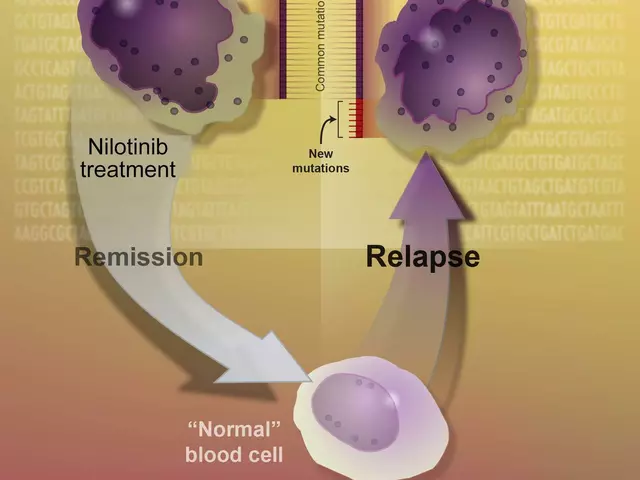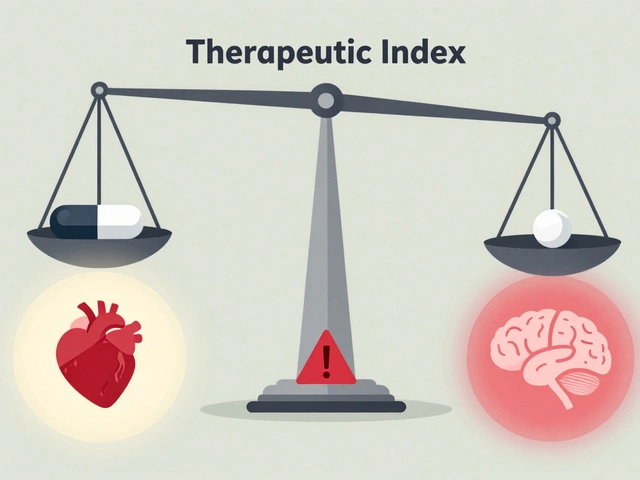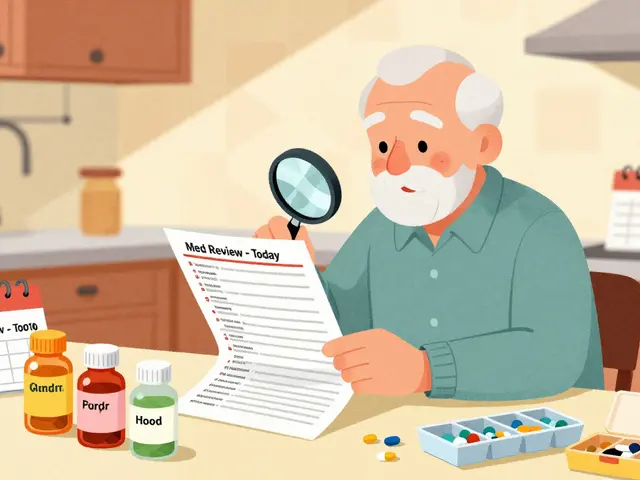If you're dealing with hypothyroidism, Synthroid (levothyroxine) is usually what comes up at the pharmacy. But what if it just doesn’t do the trick for you, or your side effects are annoying, or maybe you’d rather not take the same pill forever? Good news: You’re not stuck with only one choice.
Plenty of people need a different option—sometimes because their bodies process certain meds differently or their symptoms stick around. There are other prescription medicines, both synthetic and more 'natural,' plus some non-prescription approaches that might help depending on what your doctor thinks. Each option has its own pluses and headaches, so you’ll want to know what you’re signing up for.
This deep-dive will break down real alternatives and look at the practical stuff you actually care about, like effectiveness, side effects, and everyday hassles. By the end, you’ll know what else is out there besides Synthroid, and maybe even spot an option that suits your needs a little better.
- Levothyroxine Brands (Generic, Euthyrox, Levoxyl)
- Liothyronine (Cytomel)
- Natural Desiccated Thyroid (NDT, Armour Thyroid, NP Thyroid)
- Combination Therapy (T4 + T3)
- Iodine
- Levothyroxine Sodium Oral Solution
- Thyroid Extracts (Compounded)
- Over-the-Counter Supplements
- Lifestyle Changes
- Diet Modifications
- Summary Table of Alternatives
Levothyroxine Brands (Generic, Euthyrox, Levoxyl)
If you’re looking for Synthroid alternatives that are just as mainstream and easy to get, generic levothyroxine plus brand names like Euthyrox and Levoxyl are top contenders. All these medications basically contain the same active ingredient as Synthroid—so they work in the same way, helping replace the hormone your thyroid isn’t making.
The big difference isn’t the hormone itself, but what wraps around it—fillers, dyes, and inactive stuff. Some people are sensitive to those extras, so switching brands (or going generic) can sometimes smooth out nagging symptoms or side effects.
Generic levothyroxine comes in a wide range of strengths, and pharmacies regularly swap between different manufacturers based on price and supply. Some folks don’t notice any change; others feel the difference with each switch. If you ever notice weird new symptoms after a refill, check the label—your pills might be from another manufacturer, even when the bottle says the same thing.
Now, Euthyrox and Levoxyl are both popular branded options other than Synthroid. They can be more expensive, but some people swear by how they feel on one brand over another. Levoxyl, for example, is known for having fewer fillers, which matters if you’ve had a reaction to additives. Euthyrox, popular in Europe for ages, hit the U.S. market not too long ago and offers another solid choice if you want to switch things up.
Here’s how the common options compare:
| Brand | Main Feature | Common Fillers |
|---|---|---|
| Synthroid | Most prescribed, long track record | Acacia, lactose, dyes (in some strengths) |
| Generic Levothyroxine | Cheaper, widely available | Varies by company—lactose, cornstarch, dyes |
| Euthyrox | Popular in Europe; now in U.S. | Lactose, magnesium stearate |
| Levoxyl | Known for fewer fillers | Microcrystalline cellulose, calcium sulfate |
Doctors usually start you at a low dose and slowly bump it up. Don’t expect instant results—it takes a few weeks to see a real difference. Once your TSH levels even out, you’ll usually stick with the same brand, strength, and dosing, with occasional checkups to make sure you don’t need an adjustment.
Pros
- Widely available and affordable
- Multiple brands and strengths make fine-tuning easy
- Lots of safety data and decades of research
- Generic versions can lower your pharmacy bill
- Some brands have fewer fillers (key for people with allergies or sensitivities)
Cons
- Switching brands or generics can cause symptoms for some people
- Requires daily use and regular blood tests
- Fillers and dyes in some versions may cause reactions
- Finding the right dose can take time and patience
- Not everyone feels symptom-free, even with "normal" labs
Liothyronine (Cytomel)
If you’re frustrated with Synthroid alternatives and your symptoms just won’t quit, liothyronine could be worth talking about. It’s sold under the brand name Cytomel and is a synthetic form of T3, which is the active thyroid hormone your body actually uses. Here’s the thing: most standard meds like Synthroid (levothyroxine) give you T4, and your body has to convert it to T3. Some people have trouble with that conversion, and that’s where liothyronine steps in.
Doctors usually prescribe Cytomel to folks who don’t feel better with T4 alone. Sometimes it’s even combined with T4 for a boost. People often report that liothyronine works faster, and they see changes like more energy or better mood pretty quickly. It’s also used after thyroid cancer treatment or before radioactive iodine testing.
Pros
- Works faster than T4 meds like Synthroid—some people notice results within days.
- Especially helpful if your body doesn’t convert T4 to T3 efficiently.
- Might improve stubborn symptoms like brain fog or low mood that stick around on T4 alone.
- Dose can be tailored pretty precisely with lower-dose tablets.
Cons
- Shorter acting—levels can go up and down during the day, which might mess with your energy.
- Risk of overdoing it: Taking too much can lead to heart palpitations, anxiety, or insomnia.
- Usually not given as a solo replacement for most people—used more as an add-on.
- Needs very careful monitoring with regular blood tests.
Here’s a quick look at how Cytomel compares to Synthroid on some key points:
| Cytomel (Liothyronine) | Synthroid (Levothyroxine) | |
|---|---|---|
| Hormone Type | T3 | T4 |
| Speed of Onset | Fast (days) | Slow (weeks) |
| Dosing Frequency | 2-3 times daily | Once daily |
| Main Use | Add-on or conversion issues | First-line for hypothyroidism |
Bottom line: If you’re still feeling off on thyroid medications like Synthroid, liothyronine could be the missing piece. Just make sure a doctor is watching your levels closely, since getting the dose wrong can really throw things out of balance.
Natural Desiccated Thyroid (NDT, Armour Thyroid, NP Thyroid)
Natural Desiccated Thyroid (NDT) is an old-school alternative to Synthroid that some people swear by, especially when synthetic options just aren’t cutting it. Brands like Armour Thyroid and NP Thyroid are made from dried pig thyroid glands and, unlike most synthetics that just give you T4, these have both T4 and T3. That's important, since T3 is the more active thyroid hormone—your body usually converts T4 to T3, but not everyone does this well.
People who use NDT notice that it sometimes helps with stubborn symptoms like low energy and brain fog. While there’s no giant study saying NDT works better for everyone, smaller reports show that some folks really feel the difference. Keep in mind: because it’s made from animal glands, NDT has natural variations in hormone content, though brands try to keep things consistent.
Pros
- Contains both T4 and T3, closer to what your body naturally makes.
- Some patients feel better symptom-wise on NDT compared to Synthroid.
- Available in multiple brands (Armour, NP, Nature-Throid) for easier access.
- Some people find it gives them more steady energy and clearer thinking.
Cons
- Hormone levels can vary more from batch to batch compared to synthetics.
- Not every doctor is willing to prescribe it—some worry about standardization.
- Pig allergy? NDT is obviously not the right fit.
- Insurance sometimes won’t cover it, or only offers certain brands.
- Some users experience more side effects, like palpitations, if their dose isn’t dialed in.
For those who want a Synthroid alternative that’s a bit more “natural,” NDT is worth a talk with your endocrinologist. Just know you’ll probably need some extra bloodwork as you tweak your dose—the mix of T4 and T3 can take some finessing to get right.
| Brand Name | Main Hormones | Common Dose Range |
|---|---|---|
| Armour Thyroid | T4 + T3 (from pig thyroid) | 15mg to 120mg daily |
| NP Thyroid | T4 + T3 (from pig thyroid) | 15mg to 120mg daily |
Quick tip: If you switch to NDT, don’t skip follow-up appointments. Dosage needs can shift, especially if you’re changing brands or if the pharmacy swaps out the tablets you usually take.
Combination Therapy (T4 + T3)
If you’ve tried straight levothyroxine—like Synthroid—and your thyroid numbers look good but you still feel wiped out, you might hear about combination therapy. This mixes two main forms of thyroid hormones: T4 (levothyroxine) and T3 (liothyronine). Your own thyroid makes both, but most regular meds only replace T4 and count on your body to handle the rest. Some folks just don’t convert T4 to T3 very well, so they stay low-energy even when labs look perfect.
Here’s how it usually goes: your doctor prescribes your main dose as T4, then adds a low dose of T3. You still take a daily pill, but now both types of hormones are covered. Doctors usually keep the T3 dose much lower, since T3 works fast and can cause jitters or rapid heartbeat if there’s too much in your system. According to a study from the British Thyroid Association, about 5-10% of people with hypothyroidism still feel tired on T4 alone and may see a difference with combination therapy.
The research is a bit mixed, though. Some studies show combo therapy helps with mood and energy, while others find no big difference once the placebo effect is taken out. Still, real patients do say it helps them—especially those stubborn symptoms like brain fog, weight gain, or sluggishness that just won’t budge. Combination therapy isn’t for everyone, but it’s something to talk over with your doctor if regular levothyroxine isn’t enough.
Pros
- Can target those persistent symptoms when Synthroid or other single T4 meds haven’t helped.
- Mimics how your thyroid works naturally, by providing both main thyroid hormones.
- May improve energy, mood, or mental sharpness in some people.
- Flexible—doses can be adjusted to fit your exact needs.
Cons
- T3 works quickly and can cause side effects like anxiety or heart palpitations, especially if the dose is too high.
- Requires careful monitoring—lots of doctors want regular blood tests for safety.
- Not all doctors are comfortable prescribing it, and you might have to push for it or see a specialist.
- Some insurance plans don’t easily cover T3 meds, or may require lots of paperwork.
| Who Might Benefit? | People still feeling symptoms on T4 alone |
|---|---|
| Typical T4:T3 Ratio | About 10:1 to 15:1 (but can vary) |
| Cost | Usually more expensive than just T4 |
| Common Brands | Synthroid / Levothyroxine + Cytomel / Liothyronine |
Iodine
Here’s something a lot of people miss: without enough iodine, your thyroid can’t make thyroid hormones in the first place. That’s why iodine is key for anyone keeping an eye on their thyroid. But before you run out for supplements, you’ll want the real scoop on when it helps—and when it doesn’t.
Iodine is a trace mineral, meaning your body only needs a little, but that little bit is super important. In places where there isn't enough iodine in the diet, like some developing countries, thyroid problems shoot up. Think goiters, fatigue, and even trouble focusing. In the U.S., iodine deficiency is pretty rare because our table salt has it added in (“iodized salt”). Some people at risk include vegans, folks who skip dairy and eggs, or those who live in places with low natural iodine in the soil.
| Food Source | Approximate Iodine (mcg per serving) |
|---|---|
| Cod (3 oz) | 99 |
| Yogurt (1 cup) | 75 |
| Iodized Salt (1/4 tsp) | 76 |
| Milk (1 cup) | 56 |
If your doctor finds you truly have an iodine deficiency, supplementing can make a world of difference. But if you already get enough—from food or salt—taking more doesn’t just fail to help; it can actually mess things up. Too much iodine sometimes triggers its own set of thyroid issues, both in people with normal thyroids and those already on thyroid meds.
Pros
- Absolutely necessary for making thyroid hormones
- Can reverse thyroid problems caused by deficiency
- Easy to get enough with a normal diet—no expensive pills required
Cons
- Does not replace prescription thyroid medications like Synthroid
- Too much can trigger thyroid dysfunction—hyperthyroidism or hypothyroidism
- Not all hypothyroid patients are deficient, so blindly supplementing is risky
Bottom line? If you’re on Synthroid or another thyroid med, don’t swap it for iodine unless a doctor confirms you’re low. For most people, a little iodized salt in the kitchen will handle this piece of the puzzle.

Levothyroxine Sodium Oral Solution
For people with hypothyroidism who can’t swallow pills easily, Levothyroxine sodium oral solution is a real game changer. It has the same active ingredient found in Synthroid but comes in liquid form. That means if you’ve had gastric bypass, deal with throat issues, or just have trouble swallowing in general, you still get the benefits of this tried-and-true thyroid treatment.
The liquid is absorbed a little differently than tablets. Sometimes, it works better for folks who don’t get consistent results from pills—maybe due to digestive problems, or when other medicines (like calcium or iron) make it hard to absorb standard tablets.
You usually take it by mouth, just like other thyroid meds. There’s also a version meant for kids, who often need precise dosing. No crushing, splitting, or messy mixing—just a small measured dose swallowed or added to food as your doctor directs.
Pros
- Gentler for people who can't swallow pills or who have a feeding tube.
- More predictable absorption for those with stomach or intestinal issues.
- Less risk of missed doses due to pill refusal or spit-up (common in some kids).
- Exact dosing options, which is super important for infants and small children.
- Same trusted ingredient as Synthroid for reliable thyroid hormone replacement.
Cons
- Usually more expensive than generic tablets—insurance coverage can be spotty.
- Needs to be stored carefully (away from heat, sometimes refrigerated depending on brand).
- Taste might bother some users, especially kids.
- Same food and drug timing rules as pills—take on an empty stomach and wait before eating.
If you’re curious about how this solution stacks up versus pills, check out these numbers from a 2023 review:
| Formulation | Absorption Rate | Time to Peak Effect |
|---|---|---|
| Tablet | 60-80% | 2-3 hours |
| Oral Solution | 80-100% | 1-2 hours |
So, if tablets give you trouble, the oral solution might just be the answer for getting your thyroid hormone back on track.
Thyroid Extracts (Compounded)
If you’ve ever wondered about truly custom thyroid meds, compounded thyroid extracts might catch your eye. Unlike standard Synthroid alternatives that come in pre-set strengths, compounding pharmacies make thyroid extracts tailored to your exact hormone needs. They mix synthetic or natural (usually from pork) T4 and T3 in doses only your doctor can dream up, which can be helpful if your thyroid numbers are unpredictable or you react badly to off-the-shelf prescriptions.
What’s inside these extracts? Usually a combo of levothyroxine (T4) and liothyronine (T3). Some patients need more T3 than usual because their bodies don’t convert T4 to T3 well. That’s where customization is a big advantage. Compounded thyroid extracts are also free of common fillers and dyes, making them a good choice for people with allergies or sensitivities.
It’s not all smooth sailing, though. The main issue? There’s a thin margin for error. Small changes in your dose can make a big difference in how you feel. And unlike FDA-approved thyroid medications, compounded versions don’t have the same strict oversight—so you’re relying on pharmacy quality and accuracy. To give you a better picture, here’s a quick data snapshot:
| Standardized Pharmacies | Compounding Pharmacies |
|---|---|
| FDA-regulated | Less regulation |
| Set dosages | Custom dosages |
| Most insurances cover | Varied insurance acceptance |
If you think a compounded extract could work for you, make sure your prescriber knows their stuff—experience with compounds matters. You’ll usually need more frequent blood tests while finding your sweet spot. As with everything, don’t tweak doses yourself; talk to your doctor first since too much or too little thyroid hormone can whack your energy, heart, and bones.
Pros
- Fully customized dose (T4 and T3 ratios can be tailored)
- Option to skip fillers, dyes, and preservatives
- Useful for rare allergies or special absorption issues
- Might work better for those who can’t tolerate commercial brands
Cons
- No FDA regulation—quality depends on the pharmacy
- Insurance may not cover compounded meds
- Possible dosing inconsistencies
- Need for regular bloodwork and close monitoring
- Can be more expensive than other levothyroxine substitutes
Over-the-Counter Supplements
Walk down any pharmacy aisle and you’ll see shelves lined with Synthroid alternatives promising better thyroid support—everything from kelp tablets to selenium, zinc, ashwagandha, and multivitamins labeled 'thyroid formula.' But before you toss them in your cart, you need to know the facts.
Most over-the-counter supplements aren’t regulated the way prescription thyroid medications are. This means what’s on the label doesn’t always match what’s actually inside the bottle. A 2023 analysis found that 60% of so-called “thyroid support” supplements contained unpredictable doses of actual thyroid hormone, sometimes enough to cause real side effects like heart palpitations or mood swings.
- Iodine: Yes, your thyroid needs iodine, but too much or too little can backfire. Supplements with iodine might help if you’re truly deficient, but if your levels are normal, overdoing it can actually make your hypothyroidism worse.
- Selenium and Zinc: These two minerals can support thyroid enzyme function. Some studies back small doses (like 200 mcg of selenium daily), especially if you’re low, but you won’t see a miracle change unless you have a deficiency.
- Ashwagandha: This herb gets a lot of hype for hormone balance. Some people say it supports thyroid function, but evidence is mixed and it can interact with other meds.
Here’s a quick comparison of common supplement ingredients in thyroid treatments:
| Supplement | Main Use | Risks |
|---|---|---|
| Iodine | Boosts thyroid hormone production (if deficient) | Worsens thyroid issues if excess |
| Selenium | Supports enzyme function | Can cause toxicity in high doses |
| Ashwagandha | May help balance hormones | Unclear dosing, interacts with meds |
The bottom line? These supplements might help some people—especially if you have a proven deficiency or want a little boost—but they’re not a substitute for prescription levothyroxine substitutes. Always check with your doctor or pharmacist before starting anything new, especially if you’re taking any kind of thyroid medications already.
Lifestyle Changes
If you’re looking for Synthroid alternatives, lifestyle changes probably won’t replace your meds, but they can seriously support your thyroid and how you feel day to day. Here’s the deal: sometimes, small shifts in how you live make a noticeable difference with hypothyroidism and even how well your thyroid medications work.
Start by making these basics a habit:
- Consistent sleep schedule: Your thyroid runs on a rhythm. Aim for seven to nine hours a night—poor sleep can spike stress hormones and make thyroid symptoms worse.
- Manage stress: Chronic stress tells your body to slow down, which can throw off thyroid hormones. Simple ways to cut stress—walking outside, deep breathing, or even ten minutes of quiet reading—can help a lot.
- Regular movement: You don’t have to bench press your body weight. Even brisk walks, yoga, or short workouts can rev up your metabolism and support better energy.
Here’s something people often miss: when you take your thyroid medications, timing matters. Taking them at the same time every morning, on an empty stomach, helps them work best. Eating or drinking certain things—like coffee or calcium-rich foods—too close to your dose can mess with absorption.
Quick look at how lifestyle tweaks can stack up:
| Lifestyle Change | Impact on Thyroid |
|---|---|
| Consistent Sleep | Supports hormone balance |
| Stress Management | Lowers cortisol, reduces hormone interference |
| Regular Exercise | Boosts mood, metabolism, and energy |
| Mindful Medication Timing | Improves absorption and consistency |
These actions won’t magically cure hypothyroidism, but research shows people who pay attention to the basics feel better overall. Plus, getting these routines down can make your doctor’s job a bit easier when it comes to finding the right Synthroid alternatives if you need them.
Diet Modifications
You might not think food matters much when it comes to your thyroid, but it’s actually a big deal—especially if you’re exploring Synthroid alternatives. Certain foods and nutrients can help (or sometimes hurt) thyroid health, so it’s smart to pay attention to what’s on your plate.
Let’s start with iodine. Your thyroid needs it to make hormones, so folks with low iodine might see improvements by adding foods like seafood, seaweed, dairy, or iodized salt. Still, too much iodine can wreck your thyroid, so don’t go wild with supplements unless your doctor says so.
Selenium and zinc are next in line. Both support thyroid function. Brazil nuts are packed with selenium—just one or two a day can be enough! For zinc, beef, pumpkin seeds, and chickpeas are solid choices.
Some foods, called goitrogens, can mess with thyroid hormone production, especially if you eat a ton of them and you’re already low on iodine. Think raw cabbage, broccoli, and soy. You don’t have to cut them out altogether, but if you’re struggling with low thyroid levels, it’s smart to cook these veggies, which takes the edge off their goitrogenic effect.
- Seaweed, sardines, dairy, and eggs: Good for natural iodine.
- Brazil nuts and sunflower seeds: Selenium boost.
- Pumpkin seeds, beef, chickpeas: Zinc support.
- Cooked cruciferous veggies (like broccoli and cabbage): Less likely to block thyroid hormones.
Here’s a quick cheat sheet of nutrients that matter for a hypothyroidism friendly diet:
| Nutrient | Best Food Sources |
|---|---|
| Iodine | Seaweed, dairy, iodized salt |
| Selenium | Brazil nuts, tuna, eggs |
| Zinc | Beef, pumpkin seeds, lentils |
| Vitamin D | Salmon, fortified milk, sunlight |
If you’re taking thyroid medications, keep in mind that high-fiber diets, soy, and calcium supplements can mess with how your body absorbs the meds. Try to space out those foods from your pills by a few hours when you can.
Heads up—not everyone benefits from huge diet changes, but if you keep hitting roadblocks with Synthroid or other treatments, cleaning up your eating habits might help play backup to your main medication.

Summary Table of Alternatives
If you’re weighing your options, a side-by-side comparison helps things click. Here’s a straight-shooting table comparing the top Synthroid alternatives, their main uses, and what to look out for. These aren’t just random choices—doctors really suggest these as second-line, backup, or add-on options for people who haven’t found relief with Synthroid.
| Alternative | Main Use | Pros | Cons |
|---|---|---|---|
| Levothyroxine Brands | Generic T4 replacements | Reliable dosing, wide availability | Some brand sensitivity, tiny differences can affect some people |
| Liothyronine (Cytomel) | Synthetic T3 option | Quick relief for stubborn symptoms, good for poor T4-to-T3 converters | Shorter acting, may cause mood swings or heart palpitations |
| Natural Desiccated Thyroid (NDT) | Animal-derived T4+T3 tablets | Appeals to "natural" preferences, some feel better symptom-wise | Dose inconsistency, not for those with animal product restrictions |
| Combination Therapy (T4+T3) | Custom plans blending T4 & T3 | Targets symptoms more completely, tailored dosing | Takes more fine-tuning, not everyone needs the combo |
| Iodine | Nutrient for thyroid hormone production | Easy fix if you’re deficient, can prevent goiter | Doesn’t cure hypothyroidism if your thyroid’s damaged, too much is risky |
| Levothyroxine Sodium Oral Solution | Liquid T4, for swallowing problems | Easier to take, especially for kids or those with feeding tubes | Same side effects as tablets, taste can be off-putting |
| Thyroid Extracts (Compounded) | Custom thyroid formulas by pharmacists | Dosing flexibility, made without allergens | Costly, not as closely regulated |
| Over-the-Counter Supplements | Support thyroid health (selenium, zinc, etc.) | Can boost thyroid function if you’re low in key nutrients | Won’t replace medication, quality varies a lot |
| Lifestyle Changes | Diet, stress, sleep fixes | Good for overall wellbeing; can help symptoms when combined with meds | Not a standalone fix for hypothyroidism |
| Diet Modifications | Eating for thyroid health | Sometimes boosts energy and reduces symptoms | Need to watch out for goitrogens or iodine overload |
Some quick tips: If your biggest gripe is inconsistent symptoms, you might do better with a combination therapy or even a trial of NDT. If swallowing pills is tough, ask your doc about the liquid levothyroxine alternative. And for anyone trying supplements, always tell your doctor—some vitamins and minerals can mess with your thyroid meds and give you weird lab results.
Bottom line: The perfect thyroid medication looks different for everyone. Testing, honest doctor chats, and keeping a symptom diary go a long way in dialing in what works best for your body. Don’t settle for feeling "just okay," especially when options are on the table!







Leia not 'your worship'
25 April 2025 - 13:08 PM
So many people treat thyroid meds like they’re magic bullets, but it’s never just about the pill, is it? It’s the sleep, the stress, the gluten, the damn coffee you chug 20 minutes before your dose. I switched from Synthroid to NP Thyroid and my brain fog lifted like a fog machine turned off-but only after I stopped drinking matcha at 7am and started sleeping 8 hours. No supplement fixes what your lifestyle breaks.
Jo Sta
27 April 2025 - 02:47 AM
Stop wasting time on this NDT nonsense. If you’re not on Synthroid, you’re playing Russian roulette with your hormones. This country’s gone full woo-woo. Stick to the science, not pig glands.
KALPESH GANVIR
28 April 2025 - 14:10 PM
I’ve been on Armour Thyroid for 3 years now, and honestly? It’s the only thing that made me feel human again. I used to cry for no reason, couldn’t focus at work, felt like I was moving through syrup. After 6 weeks on NDT? I started laughing again. Not because I’m ‘healed’-but because my body finally stopped fighting itself. Just wish more doctors would listen instead of pushing the same script.
April Barrow
29 April 2025 - 09:24 AM
Oral solution works wonders for people with gastroparesis. I’ve been on levothyroxine liquid for 18 months. Absorption is consistent. No more guessing if my stomach was full or if I took it with calcium. Doctor says my TSH has been stable within 0.5 for the last year. Simple solution, underused.
Melody Jiang
29 April 2025 - 21:47 PM
There’s a quiet truth here: no single pill is the answer for everyone. The body isn’t a machine with one correct setting. It’s a whispering ecosystem. Sometimes T4 alone isn’t enough. Sometimes you need T3. Sometimes you need to eat Brazil nuts. Sometimes you need to stop checking your phone at midnight. The real alternative isn’t a drug-it’s listening. To your body. To your symptoms. To the quiet hum beneath the noise.
alex terzarede
1 May 2025 - 13:38 PM
Iodine isn’t a fix unless you’re deficient. I had a TSH of 8.7, took iodine supplements for 3 months, ended up with palpitations. Went back to Synthroid. My endo said I had Hashimoto’s. Iodine doesn’t cure autoimmunity. It just makes it louder.
Dipali patel
2 May 2025 - 17:01 PM
THEY DON’T WANT YOU TO KNOW THIS BUT NDT IS BANNED IN EUROPE BECAUSE IT CONTAINS PIG DNA AND THE FDA IS IN BED WITH PHARMA WHO MAKE SYNTHROID!! I got my NDT from a compounding pharmacy in Mexico and my energy shot up 300% but my insurance refused to cover it because they’re scared of the truth!!
Jasmine L
4 May 2025 - 14:46 PM
Just tried the oral solution last week-honestly? I was skeptical. But I’ve got a toddler who spits out pills and now I just squirt it into her mouth with a syringe. No more stress. No more crying. She’s sleeping better. 😊
lisa zebastian
5 May 2025 - 20:56 PM
Compounded meds are the only real option. Big Pharma controls the market and suppresses T3 because it’s cheaper to sell you T4 and make you take it forever. The FDA doesn’t regulate compounding because they’re afraid of the truth. My T3 levels were normal on NDT but my doctor refused to prescribe it because he’s on pharma’s payroll.
Jessie Bellen
6 May 2025 - 08:35 AM
Stop taking supplements. You’re not deficient. You just want to feel better without the pill. It’s not working. Go back to Synthroid.
Jasmine Kara
7 May 2025 - 18:18 PM
im on armur thyroid and i think its better than synthroid but i also eat a lot of kale and i dont know if that helps or hurts
Richie Lasit
9 May 2025 - 01:01 AM
Look, I was skeptical too. But if you’re still tired after months on Synthroid? Try NDT. Don’t just read about it-try it for 8 weeks. Track your energy, your mood, your sleep. And if it doesn’t click? Fine. Go back. But don’t write it off before you’ve even tried. Your body’s not broken-it’s just asking for a different key.
arthur ball
9 May 2025 - 16:37 PM
so i switched to np thyroid and i thought my life was over bc i felt like a new person but then i realized i was just… not dead inside anymore? like i could laugh without forcing it? i cried for 20 minutes after my first full night of sleep in 3 years. this isn’t medicine. this is a second chance. thank you to whoever wrote this post.
Harrison Dearing
10 May 2025 - 23:54 PM
People act like NDT is some miracle cure. It’s not. I went from 100mcg Synthroid to 60mg Armour. Got heart racing at 3am. Anxiety so bad I called my mom at 2am. Dose was wrong. Took 3 months to stabilize. Now I’m fine. But it’s not magic. It’s math. And patience. And blood tests. Lots of blood tests.
Justice Ward
12 May 2025 - 13:46 PM
Thyroid isn’t a switch you flip. It’s a symphony. Synthroid is one instrument. NDT is another. Combination therapy? That’s a duet. Lifestyle? That’s the conductor. Iodine? A tambourine. And if you play them all wrong? You get noise. But when the notes align? You get harmony. Don’t chase the pill. Chase the balance.
bhuvanesh kankani
14 May 2025 - 02:18 AM
In India, many patients rely on generic levothyroxine due to cost. While effective, consistency in absorption remains a challenge. We recommend patients maintain strict timing-empty stomach, one hour before breakfast-and avoid soy and calcium-rich foods. Regular monitoring is essential. The science is clear; adherence is the true alternative.
maria norman
15 May 2025 - 16:20 PM
Oh, so now we’re all experts because we read a blog post? Congratulations. You’ve discovered that some people don’t feel great on Synthroid. Shocking. The fact that you need a 2000-word guide to understand that your body might need T3? That’s the problem. Not the pill. The expectation that one size fits all.
Iris Schaper
16 May 2025 - 19:34 PM
i tried the oral solution and it tasted like metal and sadness but at least i didnt have to swallow a giant pill. my tsh is better now. i still hate it though.